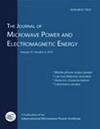智能协同式搅拌器微波加热温度均匀性研究
IF 1.5
4区 工程技术
Q4 ENGINEERING, CHEMICAL
Journal of Microwave Power and Electromagnetic Energy
Pub Date : 2023-07-03
DOI:10.1080/08327823.2023.2235550
引用次数: 0
摘要
摘要针对微波加热过程中多个物理场的相互耦合和边界条件的时变特性,重点研究了如何利用协同模式搅拌器优化物料的温度均匀性。首先,通过引入模式搅拌器可以有效避免驻波的形成,从而提高物料的加热效率。用隐式函数和水平集方法描述模式搅拌器运动过程。其次,为了优化物料的温度均匀性,将搅拌器智能化,通过使用不同的搅拌器位置和方向来优化电磁场分布,通过不同位置的搅拌器的智能协调来提高温度均匀性。最后,采用有限元法对整数变量和连续变量进行了数值模拟计算。结果表明,该方法可使传统微波加热模型在各层和铅锤段的温度均匀性分别提高28.2% ~ 81.44%和23.2% ~ 63.91%,加热效率提高14.8% ~ 36.4%。从其对不同形状和不同材料的加热性能来看,该方法是有效可行的。本文章由计算机程序翻译,如有差异,请以英文原文为准。
Study on the microwave heating temperature uniformity of an intelligent synergistic mode stirrer
Abstract Aiming at the intercoupling of multiple physics and the time-varying characteristics of boundary conditions in the microwave heating process, how to optimize the temperature uniformity of materials with a cooperative-mode stirrer is focused in this paper. First, the formation of standing waves can be effectively avoided by introducing the mode stirrer, thereby improving the heating efficiency of the material. Description of pattern stirrer motion processes using implicit functions and level set methods. Second, in order to optimize the temperature uniformity of the material, the stirrer is made intelligent, and the electromagnetic field distribution can be optimized by using different stirrer positions and directions, and the temperature uniformity is improved through intelligent coordination of stirrers in different positions. Finally, the finite element method is used to perform numerical simulation calculations on integer and continuous variables. The results show that the proposed method can improve the temperature uniformity of the conventional microwave heating model by 28.2%–81.44% and 23.2%∼63.91% at each level and lead hammer section respectively, and can improve the heating efficiency by 14.8%∼36.4%. According to its performance when heating different shapes and different materials, the proposed method is efficient and feasible.
求助全文
通过发布文献求助,成功后即可免费获取论文全文。
去求助
来源期刊

Journal of Microwave Power and Electromagnetic Energy
ENGINEERING, CHEMICAL-ENGINEERING, ELECTRICAL & ELECTRONIC
CiteScore
2.50
自引率
6.70%
发文量
21
期刊介绍:
The Journal of the Microwave Power Energy (JMPEE) is a quarterly publication of the International Microwave Power Institute (IMPI), aimed to be one of the primary sources of the most reliable information in the arts and sciences of microwave and RF technology. JMPEE provides space to engineers and researchers for presenting papers about non-communication applications of microwave and RF, mostly industrial, scientific, medical and instrumentation. Topics include, but are not limited to: applications in materials science and nanotechnology, characterization of biological tissues, food industry applications, green chemistry, health and therapeutic applications, microwave chemistry, microwave processing of materials, soil remediation, and waste processing.
 求助内容:
求助内容: 应助结果提醒方式:
应助结果提醒方式:


